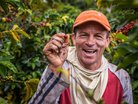Nestlé 'Meeting Sustainability Targets on Nescafé Coffee'

Nescafé, Nestlé's largest coffee brand, is sourcing over 20% of its coffee from farmers using regenerative agriculture practices two years ahead of target, according to its latest progress report.
The second Nescafé Plan 2030 Progress Report outlines how the move is contributing to improved farm yield and reduced greenhouse gas emissions.
Philipp Navratil, Head of Nestlé's Coffee Strategic Business Unit, said: "The Nescafé Plan embodies our unwavering commitment to help secure the future of coffee. This is at the heart of Nescafé.
“This second progress report is a testimony to the work we do every day on the ground with our partners, suppliers and farmers, in the regions from where we source our coffee, and it motivates us even more to continue our efforts."
- 148,000 coffee farmers in 16 countries trained in regenerative agriculture in 2023
- More than 800 agronomists and specialist staff worked with coffee farmers in Nescafé Plan field programmes
- Distributed 21 million coffee plantlets to help farm renovation and rejuvenation for better yields (cumulative total above 290 million since 2010)
- Independent assessment of regenerative agriculture practice adoption on 37 farmer units across 11 origins in 2023
- The Nestlé Global Reforestation Programme planted more than three million trees in its coffee value chains to capture carbon and support biodiversity.
The Nescafé Plan 2030 ‘aims to issue a progress report every year to update on the brand's work in helping coffee farming communities transition to regenerative agriculture practices and, as a result, to help improve their livelihoods’.
The goals are:
- By 2025: 100% responsibly sourced coffee; source 20% of coffee through regenerative agriculture methods.
- By 2030: Source 50% of coffee through regenerative agriculture methods; 50% greenhouse gas emissions reduction.
Navratil said: “By the end of 2023, 92.5% of our global coffee supplies were responsibly sourced. Plus, coffee sourced from regenerative agriculture represented more than 20% of our total 2023 volumes.”
Nescafé Plan 2030 targets regenerative agriculture
He added: “Our own actions were not the only factor at play in this transition toward regenerative agricultural practices. Many experts, both within our company and from partner organisations in the field, are playing critical roles in the Nescafé Plan.
“As farmers use techniques such as intercropping or soil analysis for the first time, technology and community groups are helping them to share their experiences and learn from others.”
To illustrate the global reach of its business and the focus on transformation in all of the nations where it has a presence, Nescafé flagged up many other highlights from 2023:
- Started expanding conditional cash incentive schemes to accelerate farmer transition to regenerative agriculture for more than 3,000 farmers in Côte d'Ivoire, Indonesia and Mexico
- Supported a pilot deployment of weather insurance for more than 800 smallholder farmers in Indonesia
- Established Agrinest, a social media platform for farmer-to-farmer connections and agricultural learning. More than 1,600 farmers in Vietnam and 240 farmers in Indonesia are already using the platform
- In Honduras, during 2023 Nescafé trained 12,000 young people from coffee communities in entrepreneurship, coffee quality and regenerative agriculture.
Nestlé has also contributed to the Regenerative Agriculture for Low-Carbon and Resilient Coffee Farms - A Practical Guidebook.
Created in collaboration with the Alliance of Bioversity International and the International Center for Tropical Agriculture (CIAT), it provides field agronomists, trainers and professionals working with coffee farmers with a set of best practices that they can use and adapt to different farming contexts, helping farmers transition to regenerative agriculture.
- In related coffee news, Global coffee prices are skyrocketing as supplies have been hit by high rainfall in Brazil and a heatwave in Vietnam, with Smart Cube analyst Kanica Goel saying the situation unlikely to improve any time soon.




